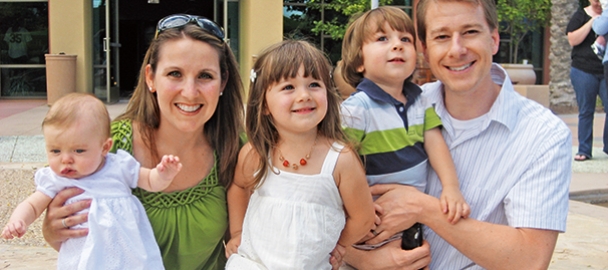
Tracy Bremmer disproves the adage that you can't be a little bit pregnant.
For nearly two months in the summer of 2009, unusual test results and ambiguous ultrasounds left doctors uncertain about the status of her pregnancy. "No one was sure whether I'd miscarried or not," she says. Tracy's obstetrician, Brian Koperek, M.D., had rarely seen a case like this. "An abnormal appearing placenta was seen at the first sign of life on an eight-week ultrasound."
A Rare Condition
Dr. Koperek immediately referred his patient to Saddleback Women's Hospital perinatologists—physicians who specialize in high-risk pregnancies. Providing one of the few high-risk pregnancy programs in the area, the hospital offers compassionate, technologically advanced care for high-risk pregnant moms and newborns.
The news from the perinatologists was both good and bad. The baby was growing and appeared healthy. But Tracy had a condition called placenta accreta, which occurs when the placenta grows too deeply into the wall of the uterus. "The placenta supplies the baby with oxygen and nutrients," Dr. Koperek explains. "Normally, it detaches easily from the uterine wall after the baby is delivered. But in women with placenta accreta, removing the placenta can lead to severe and sometimes life-threatening blood loss."
Babies of women with placenta accreta are also likely to be born too soon. To prevent premature labor and delivery, Tracy was admitted to Saddleback Women's Hospital 24 weeks into her pregnancy. She remained there on bed rest until her daughter Kate's birth in January 2010. "At first, being confined to bed for so long was unimaginable— especially over the holidays. But my family and the extraordinary staff at Saddleback made it a good experience."
Also amazing was Tracy's experience with the hospital's new Blood Donor Center, which provides patients with the safest, highest-quality blood and blood products.
A Caring Response
Because the mother of two toddlers was at high risk of hemorrhage, doctors recommended that friends and family donate blood for her. The response was overwhelming.
Forty-three people—some of whom she'd never met— donated blood. As it turned out, she would need much of it. "In spite of everything, people were amazed at how well I did," she says.
Kate was born weighing 3 pounds, 12 ounces and spent six weeks in the hospital's neonatal intensive care unit (NICU). Equipped to care for the most fragile infants, the level III NICU is staffed by a full complement of board-certified neonatologists, pediatric subspecialists, baby-friendly experienced nurses, respiratory therapists, social workers and pediatricians.
Under the staff's extraordinary, round-the-clock care, Kate soon began to thrive.
Today, she's a normal weight for her age, healthy, and according to her parents, a modern miracle. "We will be forever indebted to the hospital for all the wonderful care we were given," Tracy says. I can't express enough how grateful we are."